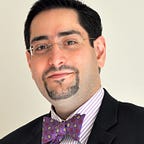Current GERD treatment paradigm: Is it time to look at how we treat acid reflux?
As a gastroenterologist, I see patients with GERD on a daily basis and I have witnessed a big disconnect between the patients’ concerns and the physicians’ priorities. The disconnect between physicians and patients is mainly because physicians are more concerned about the consequences of long term GERD while patients are seeking help from bothersome GERD symptoms or are concerned about long term use of medications that are prescribed for treatment of GERD.
Gastroesophageal Reflux Disease (GERD) or, as more commonly known, acid reflux is one of the most common chronic disorders affecting Americans. Twenty to Thirty percent of individuals in the U.S. experience symptoms related to acid reflux at least on a weekly basis. Acid reflux results in direct and indirect costs totaling around $10 billion per year to the U.S. economy. At the same time, GERD is one of the least understood disorders affecting human body.
Generally, patients with ongoing GERD, regardless of the degree and type of their symptoms, will be started on a “heartburn remedy”- usually in a form of over-the-counter or prescription medication. These medications generally work by neutralizing or decreasing the production of stomach acid. Therefore, when the stomach content backs up to the esophagus, it causes less irritation and it becomes less painful for the patients. If a patient is not getting relief with a particular medication, second or third medications will be added or the dose of the medication will be increased to above the recommended dose in hopes of achieving relief. If these approaches do not work, the patients are reluctantly educated about surgical options with a major emphasis on the side effects, complications and chance of relapse of GERD after a surgical procedure.
In situations that the patients are not satisfied with such treatment, they are sent to see a gastroenterologist. Patients’ dissatisfaction with heartburn remedies are typically because they are either not responding to medications or that they still have frequent symptoms despite being on medications. Also among those who seek advice from gastroenterologists are patients who cannot tolerate side effects of medications and those who prefer not to take medications because of a chance of long-term adverse reactions.
Patients who are referred to gastroenterologists for GERD typically undergo endoscopy, a procedure that visualizes the esophagus and stomach with a help of a flexible scope. The goal of endoscopy is to assess for issues that may occur as a result of longstanding acid reflux and to determine whether there is an underlying disorder that is mimicking reflux symptoms.
Patients with normal endoscopy or those with inflamed esophagus as a result of acid damage, are reassured and advised to resume their medications for as long as needed. Although there is a degree of comfort for the patients in getting reassured, this reassurance does not immune them from problems that can happen as a result of GERD in the future and more importantly does not resolve their pain or suffering from GERD.
The major problem with anti-reflux medications are two folds: First, despite the common perception that anti-reflux medications are safe, each year more harmful side effects of long-term use of these medications are discovered. Second, these medications do not affect the underlying process that causes GERD. Acid reflux, in majority of cases, is caused by weakening of the valve between the esophagus and stomach due to ongoing wear and tear. “Heartburn remedies” simply make GERD symptoms more tolerable without affecting the underlying process.
The downside of this treatment strategy is that the function of the valve continues to decline despite ongoing medication use. Anti-reflux medications do not slow or stop the underlying process that leads to the weakening of the valve.
Masking the GERD symptoms by medications can result in the loss of the window of opportunity for taking advantage of minimally invasive endoscopic treatments to repair the failing valve without the need for reconstructive surgery.
The alarming rate for incidence of esophageal cancer in the U.S. is a testimony that we are not managing patients with GERD appropriately. Despite all the attention to long-term complications of acid-reflux and widespread use of anti-reflux medications, GERD’s most fearful complication, adenocarcinoma of the esophagus, has been continuously on the rise for the past three decades. According to the National Cancer Institute, esophageal cancer caused by acid reflux, is the fastest-growing cancer in the U.S. since 1975. Considering this alarming statistics, it is vital for us to look at this problem from a different angle and put aside our dogmatism regarding the current “standard of care”.
We need to go back to the drawing board and look at alternative treatment options that prevent long-term complications of GERD, protect patients from adverse effects of longstanding medication use and help them with their symptoms.
In order to shed some light in to this mysterious and common problem and increase the public awareness about this disorder, I am starting a series of essays covering GERD in-depth and reviewing all the available treatment options for this disorder. If there is a particular topic of interest that you like to discuss, please contact me and I will address your question in my future articles.
